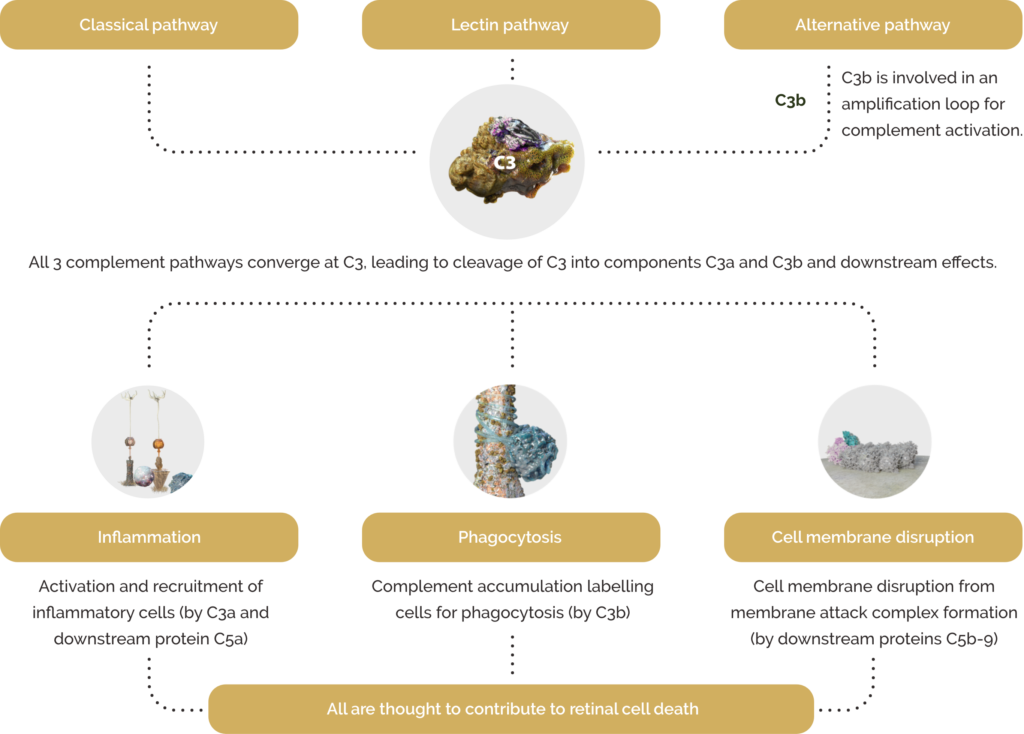Complement overactivation
The complement system plays a pivotal role in our immune response,
but overactivation can be detrimental and is associated with several serious diseases, including geographic atrophy.1

The damaging effects of complement overactivation in geographic atrophy
Overactivation of the complement system has been implicated in retinal cell loss and in GA, in which lesions cause RPE and photoreceptor cell death in the macula.2
What is the complement system?
The complement system is an integral part of our immune defence system. In healthy people, complement orchestrates the destruction and clearance of pathogens or of the body’s own cells that need to be removed. It also has proinflammatory capabilities.3
Complement activation is regulated to avoid overactivation and to protect the body against inappropriate immune attack. When regulation is compromised, hyperactivation of the complement cascade can lead to inflammation and inappropriate cell destruction.3
Three pathways converge with the cleavage of complement factor C3, which induces inflammation and labels cells for phagocytosis (destruction by special white blood cells). The complement cascade continues with the cleavage of complement factor C5, which triggers cell death via phagocytosis, inflammation, and ultimately activation of the membrane attack complex (MAC) which causes damage and cell death.3
Consequences of complement overactivation in GA2,4,5
The below graphic and videos summarize the consequences of complement overactivation in geographic atrophy.

The complement cascade and its therapeutic potential in geographic atrophy
All three complement pathways converge at C3 and it drives multiple damaging downstream effects, thus making it an attractive therapeutic target6. This potential has already been demonstrated in studies where a clinical benefit has been seen in patients with geographic atrophy.7
Therefore, targeting the complement cascade, particularly at the level of C3 and C3b, may offer a treatment option for people with geographic atrophy.7
More about the complement system
The following series of videos provides a more comprehensive overview of the complement system and its role in age-related macular degeneration.
References
- Liao, D.S, et al. (2020). Complement C3 Inhibitor Pegcetacoplan for Geographic Atrophy Secondary to Age-Related Macular Degeneration. Ophthalmology, 127(2), pp.186–195. doi:10.1016/j.ophtha.2019.07.011..
- Katschke, K.J. et al. (2018). Classical and alternative complement activation on photoreceptor outer segments drives monocyte-dependent retinal atrophy. Scientific Reports, [online] 8(1), p.7348. doi:10.1038/s41598-018-25557-8.
- Murphy K, Weaver C. Innate immunity: the first lines of defense. In: Janeway’s Immunobiology. 9th ed. London, UK: Garland Science; 2016.
- Mastellos, D.C. et al. (2017). Complement C3-Targeted Therapy: Replacing Long-Held Assertions with Evidence-Based Discovery. Trends in Immunology, [online] 38(6), pp.383–394. doi:10.1016/j.it.2017.03.003.
- Ricklin, D. (2016). Complement component C3 – The ‘Swiss Army Knife’ of innate immunity and host defense. Immunological Reviews, 274(1), pp.33–58. doi:10.1111/imr.12500.
- Sahu, A. (2001). Structure and biology of complement protein C3, a connecting link between innate and acquired immunity. Immunological Reviews, 180(1), pp.35–48. doi:10.1034/j.1600-065x.2001.1800103.x.
- Kim, B.J. et al. (2020) Mastellos DC, Li Y, Dunaief JL, Lambris JD. Targeting complement components C3 and C5 for the retina: Key concepts and lingering questions. Prog Retin Eye Res. 100936. doi: 10.1016/j.preteyeres.2020.100936.